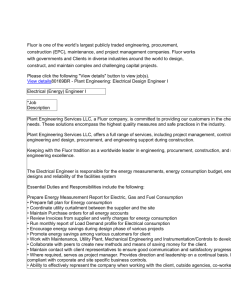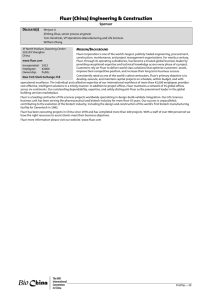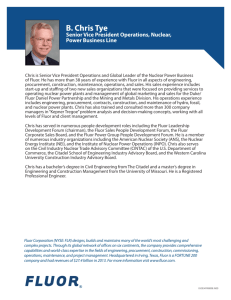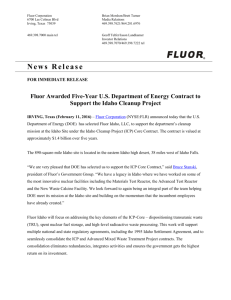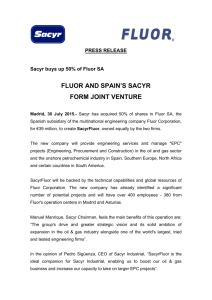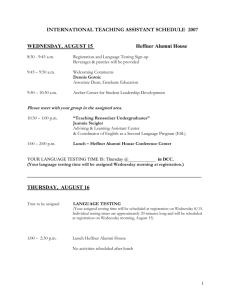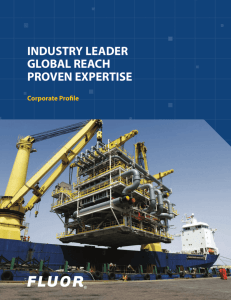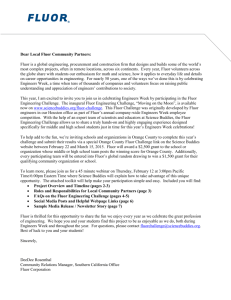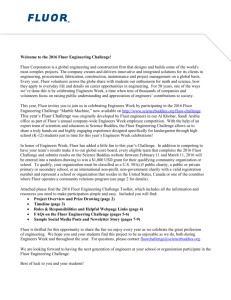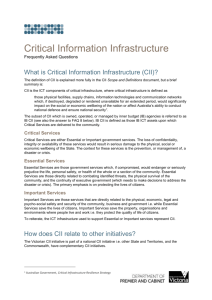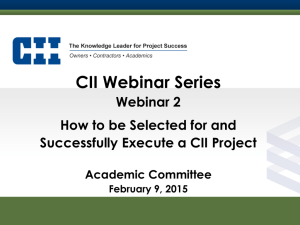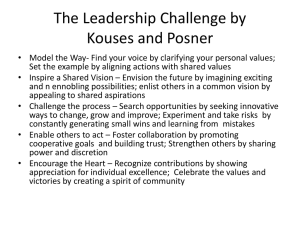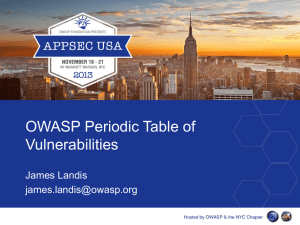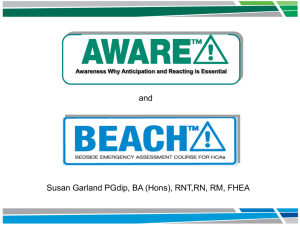Navigating Fluor University - Construction Industry Institute
advertisement
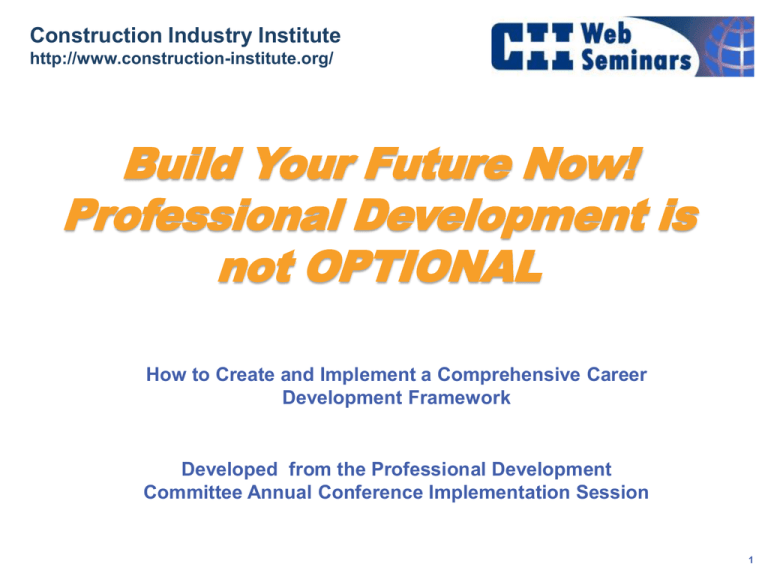
Construction Industry Institute http://www.construction-institute.org/ Build Your Future Now! Professional Development is not OPTIONAL How to Create and Implement a Comprehensive Career Development Framework Developed from the Professional Development Committee Annual Conference Implementation Session 1 Construction Industry Institute http://www.construction-institute.org/ Understand that an organization’s capacity to train employees is fundamental to its ability to survive Understand how a member company set up their university Options for smaller companies to implement a “scaled” system Highlight CII PDC offerings available to members Provide Contacts for additional information 2 Construction Industry Institute http://www.construction-institute.org/ Today – from the receptionist with the high school education to the CFO with an MBA – the entire workforce has become a skilled landscape; that means every position is in need of continuous training/development. Source: Adrian Miller, Adrian Miller Sales Training 3 Construction Industry Institute http://www.construction-institute.org/ Organizations Continue to Struggle to Prepare Workforces to Meet Growth Demands…CII Can Help!2008 2007 94% 2006 64% 86% Not Adequately Prepared Not Adequately Prepared Not Adequately Prepared Source: Softscape – Results from past three “State of the Global Talent Nation” surveys of HR professionals 4 Construction Industry Institute http://www.construction-institute.org/ Global Trends Fuel the Need for Change Tightening Labor Market: • 9% fewer workers starting careers than those leaving the workforce through 2011 • Globalization: Blending of diverse skill sets • Changing Demographics: • Addressing needs of different age groups 5 To prepare your employees and your company for the large number of baby boomers who will be retiring in the near future Increase employee engagement and morale Training and development can be proactively planned and reflected in business strategies Increased safety awareness 6 In 2008 Fluor realized that it needed to develop employees to ensure the company’s existence. There were a large number of new employees joining the company and they needed consistent on-boarding and training in the use of company practices. Years of experience to retire within the next 5 years Determined that “Fluor University” would help in all areas. 7 Fluor University Mission: Provide an integrated framework for delivering the technical, functional, business and leadership development that drives Fluor’s success. 8 Published a Comprehensive Course Catalog & Created Detailed Career Development Frameworks for Each Discipline. Launched the Fluor University Website and Provided a Single Portal to Fluor’s Learning and Development Resources. Initiated an Online Career Development Planning Capability. Implemented Video Distance Learning System & other Low Cost on-line learning opportunities. Selected Regents and Deans and others to assist with development and governance of the University. 9 Let’s look at each position’s responsibility: Board of Regents – Chaired by CEO and Business Group Presidents Ensures Fluor University drives business results Provides overall strategic direction and focus University Council – Senior level managers from each Business Group Provides strategic linkage to the business Is the ‘voice’ of the business and corporate groups to the university College Deans – Experienced and respected leader for each discipline Develops and manages curricula and programs needed to drive business results Defined curricula linked to business strategies Global Excellence Leaders – Most often duel role for College Deans Define specific discipline courses 10 Fluor University is accessed from the Fluor homepage. We will now explore how they set up their electronic University. 26 Colleges covering all disciplines (e.g. Project Controls, Project Management, etc.) Colleges are lead by Deans who are the GELs or Functional Leads of each area 50 Career Development Frameworks covering most job families Instructor led courses On line courses available 24/7 As with any system, Fluor continues to fine tune the University and make improvements. 11 Fluor University is accessed from the Fluor homepage. 12 Fluor University Homepage On the left, employees can search for a course and see what’s new. Under the first tab, employees learn more about the University and the governing members. 13 Under this tab, employees will find the Career Development Plan or the CDP. This on-line career development plan allows employees to chart their future. 14 The next tab contains links to the individual colleges 15 The Career Development Plan process is very important to both the individual employee as well as the company. The process allows an employee to identify, track and close goals which will assist them with their own development Fluor as with many other companies, endorses the 70, 20, 10 methodology. 70% of development comes from experience – such as a stretch assignment either on their current project or on a new project or maybe in a new location. The stretch assignment might be in a different function, business line, corporate or staff role. 20% of development is accomplished with mentoring. 10% is actual training, either on-line or classroom. 16 The CDP assigns the responsibility for creating the plan to the employee. The employee’s manager, mentor or sponsor all have access to the completed plan at anytime. The Career Development Plan contains: The employee’s current role and how it is developing for the future Development needs are identified and a S.M.A.R.T. goal is developed for that need An Action Plan is developed utilizing the course catalog and the Career Frameworks 17 As mentioned earlier, Fluor has developed over 50 Development Frameworks across all functions. The Frameworks contain various levels for each function. In the following example is for Contract Management you can see that there is an Entry Level, Intermediate Level and Senior Level Framework. Included in the framework are: Required Courses Recommended Courses Required Reading Recommended Reading Recommended Experiences and Performance Competencies. The following example is from Contract Management. As you will see the framework is divided into three levels: entry, intermediate and senior. 18 19 Fluor has created an electronic Career Development Plan as shown here. 20 We realize that not all companies have the resources available to them that Fluor does, so developing a University might not work. Here are some ideas of how smaller companies can implement a smaller scale program. 1. Identify if the current employee appraisal or development process allows for setting of development goals. If not, see if adding a section is possible. 2. Establish career frameworks for individual career paths within the company to allow employees to understand growth potential. 3. Compile all training and development activities into a catalog and make accessible to all employees. 4. Identify a method to track all training and experience based development activities. 21 A great starting point for creation of a comprehensive development program is the resources available to you through the Professional Development Committee. Including: 22 • CII research formatted as instructorled courses developed by industry experts and adult learning instructional designers 19 different topics Taught right from the book – or – Customized by your own trainers to specific company needs and applications 23 CII Education Modules Everything an instructor needs … • PowerPoint Slides • Lecture Notes • Exercises • Case Studies 24 Web Seminars CII Professional Development Web seminars are typically one hour in length and are scheduled periodically. Each Web seminar is made available for sale at the CII Store following the event. “Planning for Startup” – Sept 13 by Scott Cameron, Procter & Gamble Co. “Disputes Prevention and Resolution” Coming Fall 2010 The three main, underlying causes of construction disputes are: project uncertainty, process problems, and people issues. Failure to address these causes results in project disruption, cost overruns, unmet schedules, and can lead to unacceptable litigation costs. This web seminar will explore various methods to successfully prevent and resolve disputes: preconstruction techniques; dispute prevention techniques; dispute resolution techniques; and conflict resolution techniques. Michael P. Pappas, Ph.D, P.E., Pappas Consulting LLC 25 The Professional Development Continuum is an online resource to help organizations plan the development of new construction project managers (3 to 5 years of experience). The plan continuum illustrates how CII publications, education modules, online courses and instructor-led courses taught by CII Registered Providers address competency areas across the project life cycle. These are targeted to competencies on: Leadership & Human Relations Project Organization & Management Continuous Improvement Front End Planning & Risk Management Project Implementation & Controls Design, Procurement & Materials Management Construction Practices and Contracts Safety, Health, Environment & Security 26 The major categories are highlighted in gray. As an example, we will look at Project Controls… 27 28 In addition to the other items already highlighted, there are alliances that allow member companies to strengthen their professional development. Some of these are: Utilize CII Registered Education Providers Center for Lifelong Engineering Education at the Cockrell School of Education Pathfinder, LLC or Pappas Consulting, LLC These organizations each facilitate a wide variety of courses and topics. Instructions for contacting them can be found on the Professional Development home page. CII also provides the opportunity for Professional Development Hour (PDH) credits. Individuals can obtain PDHs by participating in CII Annual Conference, workshops, and web seminars. 29 Enhanced executive leadership capabilities Strategic business skills Collaborative relationships between owners and contractors with peers across the industry Benchmarking on best practices Executive level networking opportunities 30 Employee Development is critical to the overall success of companies. The war for talent will happen again in the future…are you and your employees prepared? Companies can create their own university whether small or large, the concept is very scalable. CII provides many tools to help companies with their employee development needs If you need further information, please contact any member of the PDC. Contact information is on the CII Website. https://www.construction- institute.org/scriptcontent/prodev.cfm?section=prodev 31
